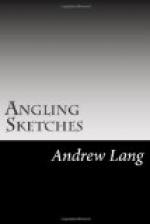One great mistake is made by the company which farms the Loch, stocks it, supplies the boats, and regulates the fishing. They permit trolling with angels, or phantoms, or the natural minnow. Now, trolling may be comparatively legitimate, when the boat is being pulled against the wind to its drift, but there is no more skill in it than in sitting in an omnibus. But for trolling, many a boat would come home “clean” in the evening, on days of calm, or when, for other reasons of their own, the trout refuse to take the artificial fly. Yet there are men at Loch Leven who troll all day, and poor sport it must be, as a trout of a pound or so has no chance on a trolling-rod. This method is inimical to fly-fishing, but is such a consolation to the inefficient angler that one can hardly expect to see it abolished. The unsuccessful clamour for trolling, instead of consoling themselves, as sportsmen should do, with the conversation of the gillies, their anecdotes of great trout, and their reminiscences of great anglers, especially of the late Mr. Russell, the famed editor of the “Scotsman.” This humourist is gradually “winning his way to the mythical.” All fishing stories are attached to him; his eloquence is said (in the language of the historian of the Buccaneers) to have been “florid”; he is reported to have thrown his fly-book into Loch Leven on an unlucky day, saying, “You brutes, take your choice,” and a rock, which he once hooked and held on to, is named after him, on the Tweed. In addition to the humane and varied conversation of the boatmen, there is always the pure pleasure of simply gazing at the hillsides and at the islands. They are as much associated with the memory of Mary Stuart as Hermitage or even Holyrood. On that island was her prison; here the rude Morton tried to bully her into signing away her rights; hence she may often have watched the shore at night for the lighting of a beacon, a sign that a rescue was at hand.




